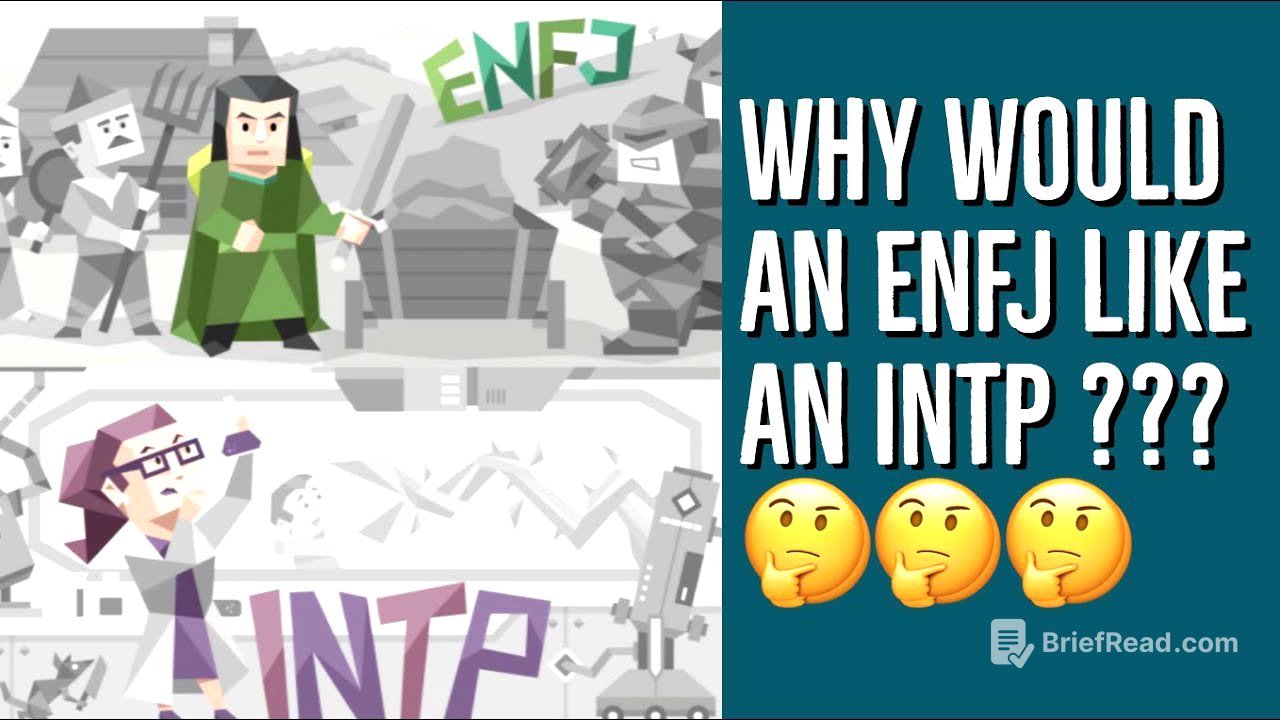TLDR;
Megan discusses the dynamic between ENFJs and INTPs, addressing the common question of why an ENFJ would be attracted to an INTP. She highlights their shared judging function supported by intuition, which leads to a unique understanding and appreciation for each other's perspectives. Despite potential conflicts arising from different communication styles and emotional expression, the relationship can be fulfilling due to the intellectual stimulation, mutual refinement of ideas, and the deep sense of being understood that INTPs offer to ENFJs.
- ENFJs and INTPs share a judging function supported by intuition, leading to a unique understanding.
- INTPs provide intellectual stimulation and help ENFJs refine their perspectives.
- ENFJs value the deep sense of being understood by INTPs, which can alleviate feelings of loneliness.
Intro [0:00]
Megan introduces the topic of why ENFJs might be attracted to INTPs, a question she frequently receives. She mentions having created previous videos about INTPs and how ENFJs view them, noting the potential for a compatible but sometimes challenging relationship.
Communication and Conflict [0:51]
The speaker describes the contrasting approaches to conflict resolution between ENFJs and INTPs. ENFJs prefer immediate, open expression of feelings, while INTPs need space to process before discussing issues. This difference can lead to a love-hate dynamic, with ENFJs sometimes perceiving INTPs as passive-aggressive. Despite these challenges, many INTPs have shared positive experiences with ENFJs, although some viewers express disagreement, highlighting the diversity within personality types.
Understanding and Value [3:27]
The content creator expresses surprise that INTPs find value in relationships with ENFJs, as they often appear self-sufficient. She notes that INTPs may show affection subtly, requiring close attention to recognize it. To remain humble, she assumes that people are generally indifferent to her, which helps her avoid presumptions about their feelings. She emphasizes the importance of direct communication, as she prefers people to state their feelings explicitly rather than expecting her to read their minds.
Emotional Intelligence and Cowardice [6:10]
The speaker addresses the concept of emotional intelligence, viewing those with low emotional intelligence as potential threats. She dislikes cowardice, not out of malice, but because she sees fear as the opposite of love. She fears those who are afraid to be true to themselves, as they may inflict pain on others. She suggests that some INTPs, when dealing with deep, unresolved pain, might project their issues onto others without realizing it, due to their focus on logic over emotions.
Shared Judging Function and Intuition [11:34]
ENFJs and INTPs share a judging function supported by intuition, setting them apart from other types. Both types are concerned with social groups and systems, often imposing their ideology onto the world. Their perspectives are driven by intuition, and they have a sensing blind spot. This can make them forceful in their beliefs, leading to defensiveness when their views are questioned.
Defensiveness and Perspective [14:46]
Both INTPs and ENFJs can be defensive because they hold their perspectives dearly, yet they harbor doubts due to their reliance on intuition over sensing. They seek agreement and want to be persuasive. INTPs aim to ensure others understand their logic and do the right thing, appreciating when others point out errors in their systems.
ENFJs and Intimacy [18:00]
ENFJs, despite appearing popular, often feel misunderstood. They seek intimacy and deep, meaningful conversations where both parties learn and grow. While INTPs also value such conversations, they may not have the energy for them as frequently as ENFJs desire.
Unique Contributions of INTPs [20:52]
The speaker appreciates INTPs for their unique perspectives and ability to add to her ideas. INTPs often provide supporting evidence, such as references to books, podcasts, and philosophical concepts, which enriches her understanding. They essentially source her arguments, expanding her perspective and compensating for potential conflicts.
Conflict Resolution and Attention [23:32]
For ENFJ and INTP relationships to succeed, it's crucial to establish a protocol for conflict resolution. ENFJs need immediate attention and reassurance during conflicts, as they struggle to calm down alone. INTPs provide valuable attention by engaging with the ENFJ's logic, helping them refine their ideas and grounding them.
Self-Esteem and Understanding [26:05]
The speaker believes that the question of why an ENFJ would like an INTP stems from the INTP's desire to be loved and their potential self-doubt. She asserts that true self-esteem comes from knowing one's inherent value, regardless of others' perceptions. She values INTPs for their consistent desire to do the right thing, even if they sometimes struggle to identify it.
Extroverts and Loneliness [28:07]
Extroverts, especially ENFJs, can feel lonely even in crowds. They seek someone who truly sees and appreciates them for who they are. INTPs offer this by being open to hearing and understanding their ideas, which can be a refreshing experience for ENFJs who often feel rejected for their intuitive insights.
The Need to Be Understood [29:58]
ENFJs need to be understood and have their deep, subconscious opinions drawn out, a task that INTPs and ISTPs are particularly adept at. The speaker shares a personal anecdote about an INTP who encouraged her to share her opinions freely, which significantly boosted her confidence and ultimately led to the creation of her YouTube channel.
Conclusion and Call to Action [32:39]
The speaker concludes by encouraging viewers to subscribe to her channel and join her Facebook group for further discussions on personality typology. She also invites viewers to support her on Patreon.









